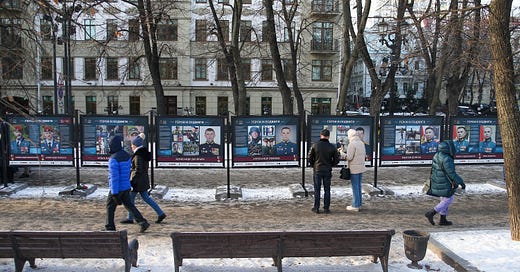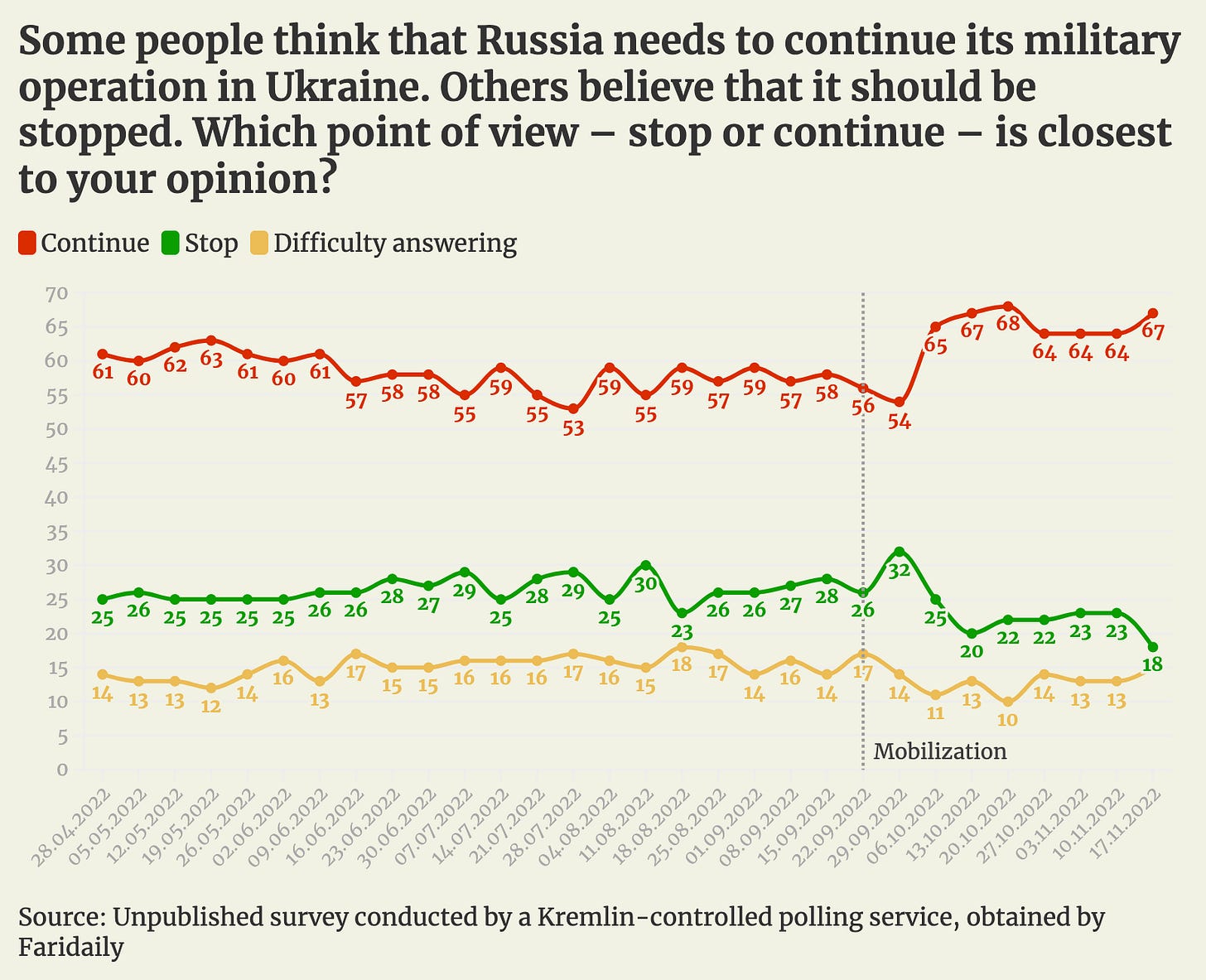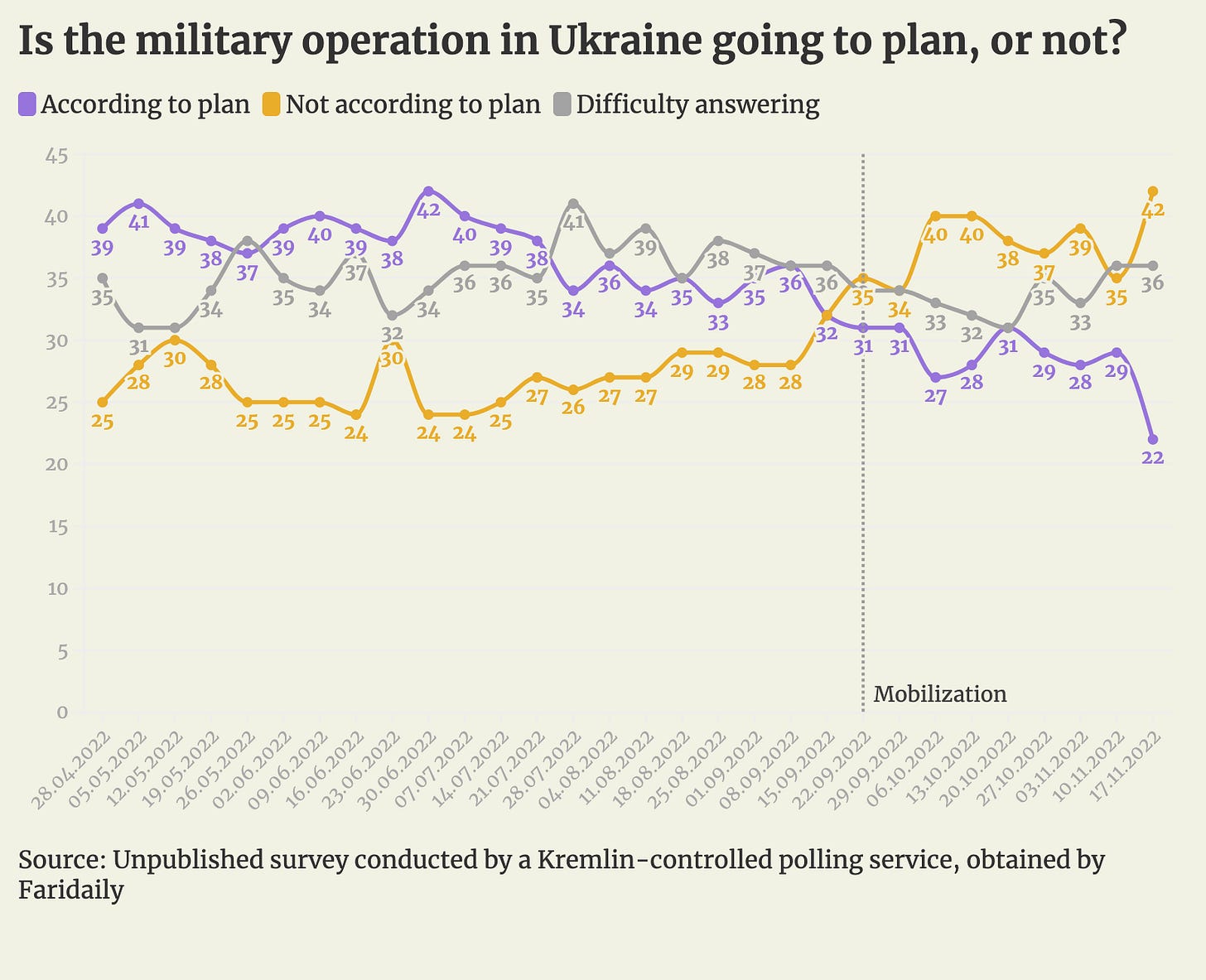What Secret Russian State Polling Tells Us About Support for the War
Do Russians support the war in Ukraine?
Эта статья на русском языке доступна здесь
This article was translated and edited with the help of our colleagues from the Moscow Times
Do Russians support the war in Ukraine? This question has been discussed intensely since the invasion in February. According to surveys from major Russian pollsters (including the independent Levada Center and state-controlled VTsIOM) about 75% of the population does support the invasion. But many are deeply skeptical of these figures.
Russian officials have access to much more information on attitudes than is ever released to the public — and it is well known that the Kremlin keeps a close eye on public opinion.
So, we decided to look into how Russian officials view the situation. In the process, it became clear that a group of officials, political managers and experts have been carrying out confidential opinion polls on attitudes toward the war for at least six months. We obtained access to this previously unpublished data.
These surveys were conducted by a Kremlin-controlled polling service. Respondents were asked not only whether the war should have been started in the first place, but whether it is going according to plan and whether it should be continued.
The weekly telephone polls surveyed 900 people. Political expert Grigory Yudin, a professor at the Moscow Higher School of Social and Economic Science, said that the statistical margin of error in such a survey is no less than 3.3%. According to Yudin, there is little point in analyzing the absolute numbers in such surveys — but it is helpful to look at trends.
We analyzed the results and discussed them with independent experts.
After nine months of war in Ukraine, fewer and fewer Russians believe Putin did the right thing by starting the conflict — 60% as of Nov. 17. This is still a majority, but it’s at its lowest level in six months and has dropped 10 percentage points since spring.
Age appears to be a major factor in the responses. In the 18- to 45-year-old category, about 40% of respondents said they think it was right to start the war. Younger respondents, who make up a quarter of the population and generally get their information from the internet, account for most of the overall drop in support for the war since the start of the fighting.
In the older age group (over 45), 76% approve of Putin's decision to go to war. Although this is also the lowest level of approval since spring, there have been no dramatic changes.
Another interesting nuance is that, among younger people, there has been a sharp increase in the number of respondents replying "unsure" — now at 36%. This might be a way to avoid answering the question, according to Yekaterina Schulmann, a political scientist and researcher at the Robert Bosch Academy in Berlin. "It’s possible that a respondent thinks the answer he wants to give is the wrong one, so he doesn’t give it,” she said.
Yudin attributed the rising number of “unsure” responses to Russia’s “partial” mobilization announced in September. "People are terribly afraid. They suspect that the polls are being conducted by the state and that they are being observed,” he said.
Paradoxically, despite more and more people believing the war should never have been started, the share of those who support a continuation of the war has been growing. As of Nov. 17, 67% supported continuing the fight. And only 18% of respondents would like the authorities to end the war — the lowest number in six months.
This apparent rise in militarism is seen among both younger and older respondents.
We spoke to several leading experts to try and explain this contradiction. According to Schulmann, people are taking a "we shouldn't have started it, but we must go on" attitude because they realize Russia is losing. “The notion of defeat leads people to the conclusion that the military operation must not end now — ‘We can’t leave when we’re losing.’ People are afraid of the consequences of military defeat,” Schulmann said.
Expert Yudin suggested that a shift in Russia’s propaganda output was the cause. "Recently, propagandists have been pushing the idea that it isn’t so important if it was right or wrong for Russia to start all this. But now it’s allegedly clear that Russia is fighting against NATO, and Russia will be crushed if it doesn’t win," he said.
Denis Volkov, director of the Levada Center, said sociologists observed a similar phenomenon in 2014 when Russia annexed Crimea and started a conflict in eastern Ukraine.
"This is a typical sort of logic,” he said. “Was it worth it? Probably not, because the cost of it is going up, including the cost for people personally. But since we got ourselves in this mess, we might as well keep going.”
However, Volkov points out that, when respondents are offered an alternative like peace talks (such as in Levada Center polls), a growing number of people choose this option. "The general mood is to end everything quickly, but without major concessions," Volkov said, adding that support for negotiations grew after mobilization.
A similar trend is shown in a confidential poll conducted by the Federal Guard Service (FSO) that was published last month by Meduza.
"People are anxious. They don't understand what a victory in this war will look like and when it will come," said one government official who spoke to us after seeing the polling results.
The final question regularly asked by these polls is whether respondents believe the military operation in Ukraine is going according to plan.
Since the summer, the number of people who believe the war is not going to plan has been growing steadily. According to the latest data, this recently reached its highest level: 42%. At the same time, the number of respondents who believe the war is going as planned has been trending downward. The latest figure in November is the lowest ever — just 22%.
Both younger and older generations are generally in agreement on this question. But, among Russians aged 18-45, there was a noticeable surge in awareness of military failures after the announcement of mobilization.
The surrender of Kherson and other military defeats amid the successful counteroffensive conducted by the Ukrainian Armed Forces have not had a serious impact on people's opinions, but they have created a negative background, Levada Center’s Volkov said.
"There is a growing number of people who believe the war is not going well, but when you ask why, their first response is that it has dragged on [too long], which means that things have not gone according to plan. The second most popular answer is the declaration of mobilization, which means the professional military is failing,” Volkov said.
Growing frustration among young people is why the authorities probably won’t attempt a second major mobilization, according to Schulmann. "The mobilization caused panic and stirred everyone up. People were greatly relieved when the mobilization drive ended, and the system in Russia is aimed at ensuring its own survival,” she said.
When we spoke to officials who were involved in organizing the mobilization, they said they also doubted that Putin would officially announce a second wave of call-ups.
Overall, the data from these secret Kremlin polls suggests that people remain more or less loyal to the authorities.
“These polls reflect Russian society as inert and frightened; a country with a broken back,” said Schulmann. “This is not bad news for the authoritarian political model since you can do anything with citizens like this — everything except mobilize.”








A guy with a sociology diploma and about 20 years of market research practice here.
Several considerations need to be taken into account here.
First of all, polling in an authoritarian society is a bogus exercise. Primarily via phone interviews, where a respondent knows (s)he isn't anonymous.
Next, government-affiliated pollsters pride themselves on the fact that the age/gender structure of their sampling is top-notch but disclose other parameters very hesitantly. Only the occasional slip-ups by FOM agency revealed that the share of respondents who cite the Internet as their primary source of information plummeted (it was above 50% in 2021). So those responding are the TV viewers, and other population segments avoid polling.
Participation rates have plummeted. VTSIOM govt pollster cites on its pages that it has to dial 40'000-45'000 phone numbers a week to achieve the quota of 1'600 completes - that's a 3.5% success rate.
Also, the govt pollsters have repeatedly been found to test multiple wordings of the same questions. Some are phrased as a "confidence vote," where a respondent is asked to evaluate not a given topic by itself but Putin's decision on that topic.
Finally, there are govt pollsters who publish the results of the surveys where fieldwork is, err, questionable by itself. Take "Insomar," a new player in the field, which on September 20th published a "survey" of Kherson, Zaporizhia, "LNR" and "DNR" residents on the "referendum" to join Russia, with 80-sh claimed participation and approval rates. I leave it to the reader to decide whether it is believable or at least counts like a poll.
Ignorance is clearly bliss for you. Or well-paid.
Ukraine's civilian airports were affected because in many cities the military fields are on the same territory. I don't need to ask "my friends in Kyiv" as I live here.
You don't read very well, either. I already mentioned that I have freinds who survived the occupation of Bucha. The issue in Bucha and other occupied towns was not shelling so much as it was the mass cruelty and theft that went on on the part of the russian forces. The minute they left Kherson, they started shelling the city.
The casualties at Yavoriv were never a secret.
You are obviously just a troll spouting the disinformation that you're being told to spout. This "convesation" is over.